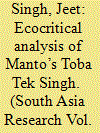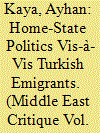| Srl | Item |
| 1 |
ID:
180678


|
|
|
|
|
| Summary/Abstract |
This in-depth analysis of the aesthetics of place and person in ‘Toba Tek Singh’, a famous short story by Saadat Hassan Manto, and a masterpiece of South Asian literature in English, presents a re-reading in the light of ecotheoretical concepts of ‘place’. It theorises how material space as ‘place’ is represented in literature and brings to light the hegemony of sociocultural discourses in relation to space, belittling its connection to nature. Ecotheory raises concerns of human and non-human life within the natural ecosystem of specific indigenous places. The protagonist of the story, Bishan Singh, ultimately also the namesake of a place, Toba Tek Singh, dies a terrible death while desperately searching for his native place. The article presents the story as a powerful literary attempt to re-imagine the places and spaces where we live and our relations to them.
|
|
|
|
|
|
|
|
|
|
|
|
|
|
|
|
| 2 |
ID:
188176


|
|
|
|
|
| Summary/Abstract |
This article scrutinizes the ways in which Turkish state actors have shaped the social ecosophy of emigrants and their descendants residing in Europe. Describing the Turkish state’s perspectives toward emigrants reveals that Turkish state actors always have instrumentalized emigrants since the beginning of the migratory processes in the 1960s. The focus will be on the current Turkish government’s acts and policies, which are likely to contribute to the Muslimization of Turkey-origin emigrants in diaspora, or in other words, to their labeling simply as ‘Muslims’. Based on a thorough analysis of secondary literature, discourse analyses of contemporary Turkish political leaders’ speeches aimed at Turkish emigrants and their descendants as well as my earlier and ongoing field research findings, I argue that it is the indifference of some European state actors who have not offered political opportunity structures for devout Muslims with Turkish background to be incorporated into the public/political space at the expense of pushing them into the Turkish state actors’ hands that offer alternative political opportunity structures. Hence, the article elaborates the ways in which receiving states’ policies and practices toward migrant-origin people impact diaspora politics of the migrant-sending states. The emphasis is on German and Turkish state actors.
|
|
|
|
|
|
|
|
|
|
|
|
|
|
|
|